by Lisa Cooke | Oct 27, 2017 | 01 What's New, Records & databases
Explore new Irish Genealogical Abstracts that have become available this week. They are a great alternative to records destroyed in the 1922 Dublin fire! Also new are church and burial records for England, poorhouse records for Scotland, German military recruitment, documents, and colonial letters for Australia. Finally, a variety of exciting collections are now online for the U.S. for Massachusetts, New Mexico, Georgia, and more!
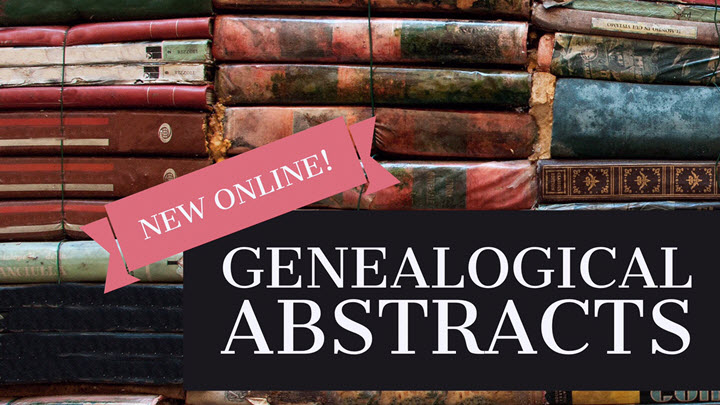
Irish Genealogical Abstracts
New this week at Findmypast are several genealogical abstract collections! First is the Thrift Irish Genealogical Abstracts, created by renowned Irish genealogist Gertrude Thrift. This collection features copies of wills, bill books, parish registers, commission books, and freeman lists, as well as detailed family trees and pedigree charts. Records in this collection date as far back as the 16th century and up to the early 20th century.
Next is the Crossle Irish Genealogical Abstracts collection. Explore the various notebooks of 19th-century genealogists Dr. Francis Crossle and Philip Crossle to reveal a wealth of Irish genealogical resources including copies of records destroyed in the fire at the Public Record Office in Dublin in 1922.
Finally, the Betham Irish Genealogical Abstracts features abstracts and genealogical sketches created by herald Sir William Betham, the Ulster King of Arms. The notebooks are an excellent substitute for missing records and include abstracts of wills, reconstructed family trees, and detailed pedigrees.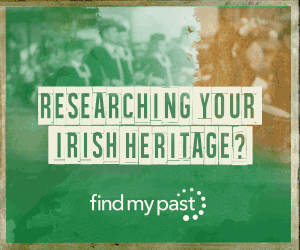
Also new for Irish genealogy this week is the Cork, Pobble O’Keefe Census 1830-1852. Search these records to discover who your ancestor was living with as well as their occupation, birth year and marital status.
Findmypast is the leader in genealogical records for Ireland, the UK, and now including U.S. and Canada. Get a two-week free trial of their premium subscription and explore millions of Irish record and more! Click here to subscribe now.
England Parish Records
Extracted Church of England Parish Records, 1538-1837 for Nottingham, England are now available online at Ancestry.com. The records include baptisms/christenings, burials, marriages, tombstone inscriptions, obituaries, tax lists, wills, and other miscellaneous types of records.
Over 75,000 records have been added to Findmypast’s collection of Yorkshire Burials, covering Anglican parishes and municipal cemeteries. Find your ancestor’s name, age at death and burial place, with more than 4 million records covering over 400 years.
Scottish Poorhouse Records
New for Scotland are Kirkcaldy, Fife, Poorhouse Records, 1888-1912. This collection includes records for those who received help from the Abden Home Poor Law Institution, originally named the Kirkcaldy Combination Poorhouse.
German Military Records
 Halle(Saale), Military Recruitment Lists, 1828-1888 are now online at Ancestry.com.
Halle(Saale), Military Recruitment Lists, 1828-1888 are now online at Ancestry.com.
From the collection description: “These recruitment lists are arranged in chronological-alphabetical order and contain detailed information about male military personnel in the city. Typically records for young men begin at age 20. Therefore this collection includes age groupings for men born beginning in 1808 up to and including 1868.”
Australia – New South Wales
At Ancestry.com, you can now explore the New South Wales, Colonial Secretary’s Letters, 1826-1856 collection. If you had ancestors living there during that time period, you can find a wealth of information in this collection, including petitions by convicts for sentence mitigation, marriage permission requests, character memorials for potential settlers, land grant or lease applications, official visit reports, information about court cases, and lists of assigned servants.
United States – Maps & More
Confederate Maps. The Cartographic Branch of the National Archives has announced the digitization of over 100 Confederate maps from Record Group (RG) 109. All are now available to view or download through their online catalog. “These maps can include rough sketches created quickly before or during a battle, but can also include maps that were drawn to accompany official reports or even post-war publications. Many are highly detailed and colorized.”
Massachusetts. At AmericanAncestors.org (the website of the New England Historic Genealogical Society), 12 new volumes have been added to the parish of Immaculate Conception in Salem to Massachusetts collection, Roman Catholic Archdiocese of Boston Records, 1789-1900. This update consists of 23,972 records and roughly 90,300 names.
New Mexico. Bernalillo County, New Mexico, Marriage Index, 1888-2017 are now available online at Ancestry.com. The original records come from Bernalillo County Record’s Office, Albuquerque, New Mexico.
Georgia. From a recent press release: The Digital Library of Georgia (DLG) is celebrating its 1 millionth digitized historic newspaper page. The premier issue of the Georgia Gazette, Georgia’s first newspaper, published from 1763-1776 in Savannah, will become the 1 millionth page of historic newspapers to be made freely available online through the Georgia Historic Newspapers (GHN).
Colorado. Also celebrating a 1 million milestone is the Colorado Historic Newspapers Collection (CHNC), from the Colorado Virtual Library. The millionth page came from the Montrose Daily Press, Volume XII, Number 247, April 21, 1921, which is part of a digitization project supported by Montrose Regional Library District.
Disclosure: This post contains affiliate links and Genealogy Gems will be compensated if you make a purchase after clicking on these links (at no additional cost to you). Thank you for supporting the free Genealogy Gems podcast and blog!
by Lisa Cooke | Jun 14, 2017 | 01 What's New, Genealogy Gems Podcast
The Genealogy Gems Podcast
Episode #204
with Lisa Louise Cooke
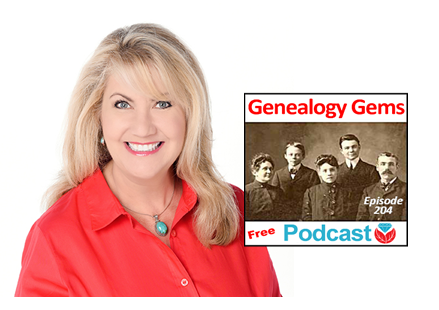
Canadian expert Dave Obee shares the story of the Canadian home children tips on newspaper research. Also in this episode:
New site features at MyHeritage, including improved DNA ethnicity analysis (it’s free?upload your DNA!);
An excerpt from the Genealogy Gems Book Club interview with Fannie Flagg about The Whole Town’s Talking?and a great summer reading idea;
A detailed get-started guide to British Isles research: Terminology and census/civil BMD record tips from Kate Eakman at Legacy Tree Genealogists
Why so many weddings are traditionally held in June.
[display_podcast]
Download the show notes
NEWS: DNA AND CATALOG UPDATES AT MYHERITAGE
MyHeritage.com: DNA ethnicity estimate updates and new collection Catalog
View an example of the new ethnicity analysis presentation here: https://vimeo.com/218348730/51174e0b49
3 top uses for the new MyHeritage catalog (with additional details and commentary)
MyHeritage Quick Reference Guide (Newly-updated in 2017)
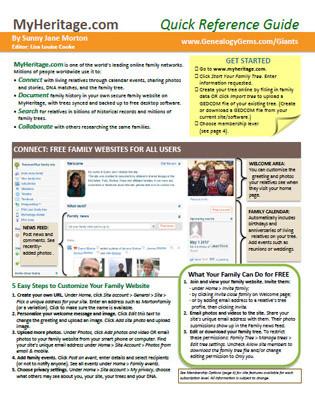
Genealogy Giants: Comparing the 4 Major Websites. This brand new, comprehensive guide helps you answer the question, “Which genealogy websites should I use?”
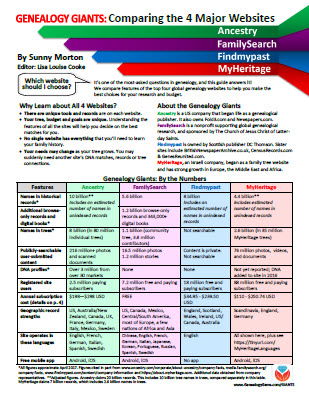
MAILBOX: BOOK CLUB COMMENTS

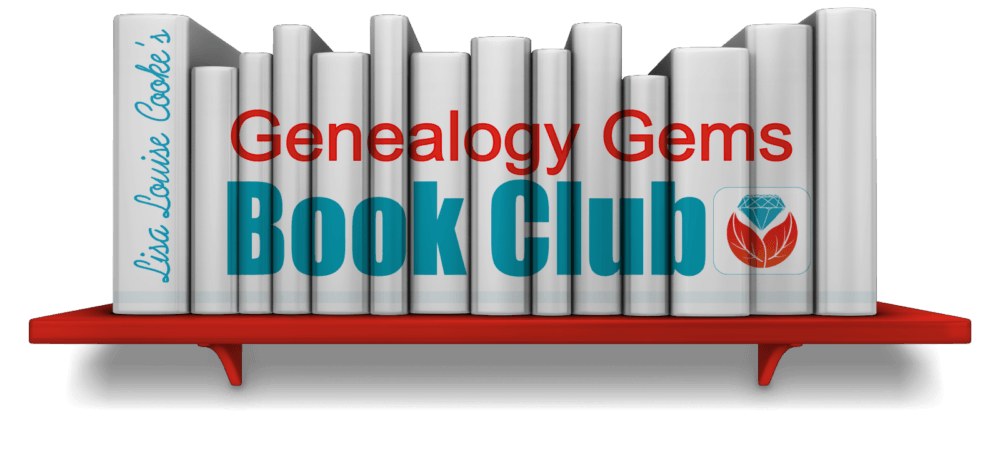
Visit the book club here.
Companion video recommendations:
Genealogy Journey: Running Away to Home video (click here to see the book)
“You Came and Saved Us” video with author Chris Cleave, Everyone Brave is Forgiven
Alan Cumming on Who Do You Think You Are? Episode summary
Not My Father’s Son by Alan Cumming
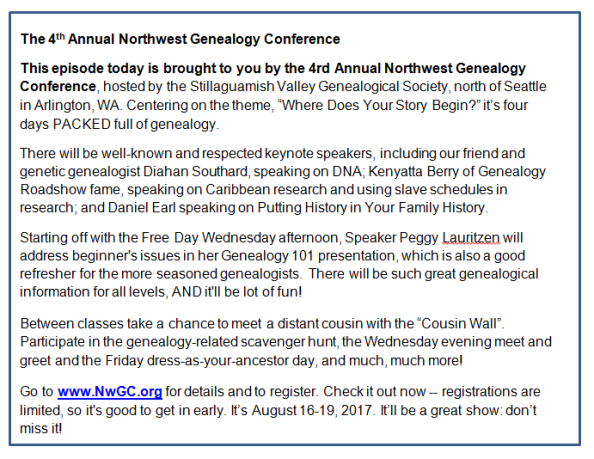
For more information: www.nwgc.org
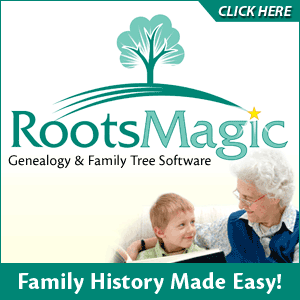
Lisa Louise Cooke uses and recommends RootsMagic family history software. From within RootsMagic, you can search historical records on FamilySearch.org, Findmypast.com and MyHeritage.com. In the works: soon RootsMagic will be fully integrated with Ancestry.com, too: you’ll be able to sync your RootsMagic trees with your Ancestry.com trees and search records on the site.
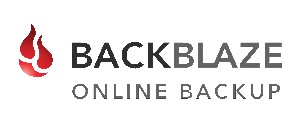
Learn more or sign up for Backblaze here.
Keep your family history research, photos, tree software files, videos and all other computer files safely backed up with Backblaze, the official cloud-based computer backup system for Lisa Louise Cooke’s Genealogy Gems. Learn more at http://www.backblaze.com/.
INTERVIEW: DAVE OBEE

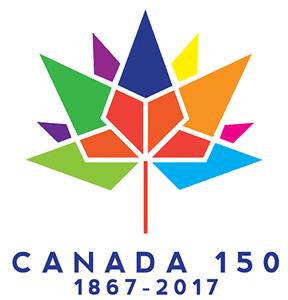
Continuing our celebration of Canada’s 150th birthday!
Dave Obee is an internationally-renowned Canadian journalist, historian and genealogist. Dave is a columnist for Internet Genealogy and Your Genealogy Today (formerly Family Chronicle). Dave has also written about family history for Canada’s History and Your Family Tree in the United Kingdom.
Put Dave’s books on your shelf – you can get them here.
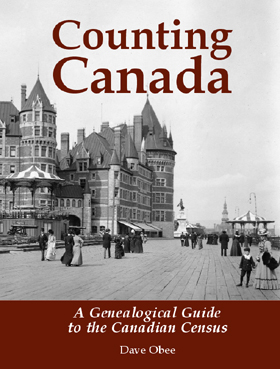
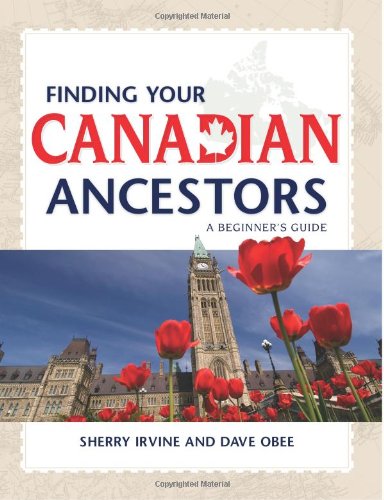
Finding Your Canadian Ancestors: A Beginner’s Guide
Counting Canada: A Genealogical Guide to the Canadian Census
Destination Canada: A Genealogical Guide to Immigration Records
Making the News: A Times Columnist Look at 150 Years of History
Canada research tips:
Look in newspapers for ship crossings, notable people sailing, approximate numbers of passengers etc.
Don’t just rely on search engines for digitized newspapers. Browse the papers where you find some hits.
Canada Home Children: Watch and Learn
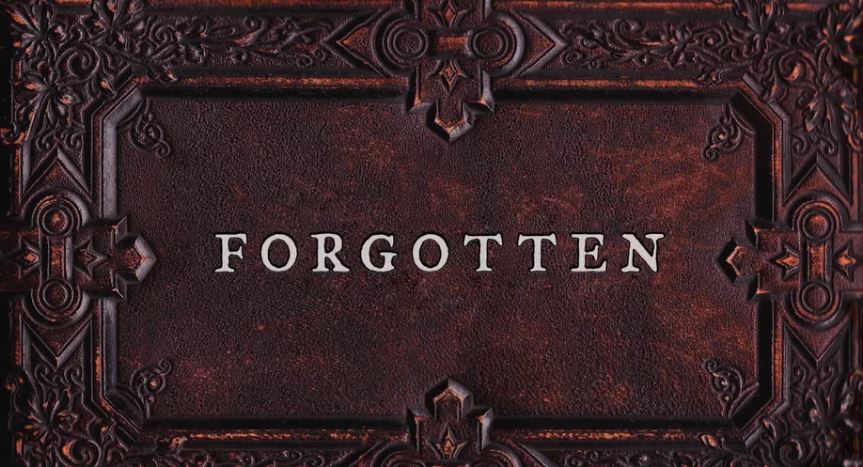
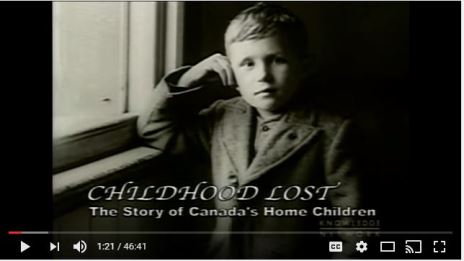
Forgotten, an award-winning documentary (watch the trailer here)
Childhood Lost: The Story of Canada’s Home Children documentary (watch it on YouTube)
LEGACY TREE GEM: ENGLISH PARISH RECORDS
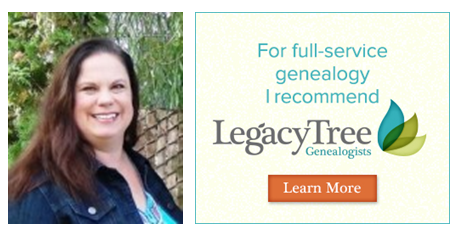
Visit Legacy Tree Genealogists: http://www.legacytree.com/genealogygems
Read a companion blog post on English parish records, with several image examples and links to the resources Kate Eakman recommends.
Legacy Tree Genealogists provides expert genealogy research service that works with your research goals, budget and schedule. The Legacy Tree Discovery package offers 3.5 hours of preliminary analysis and research recommendations: a great choice if you’ve hit a brick wall in your research and could use some expert guidance.
GENEALOGY GEMS BOOK CLUB: FANNIE FLAGG INTERVIEW
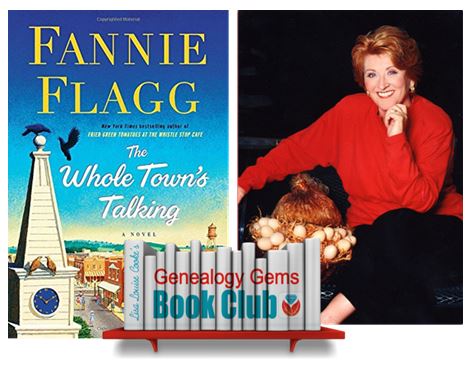
The Whole Town’s Talking by Fannie Flagg
Genealogy Gems Premium website members may hear this entire conversation in the upcoming Genealogy Gems Premium Podcast episode #148.
BONUS CONTENT for Genealogy Gems App Users
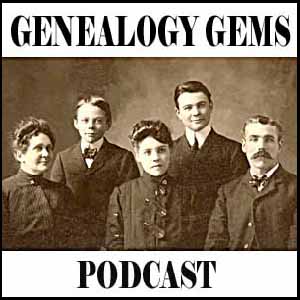
LINK IMAGE TO: http://lisalouisecooke.com/get-app/
If you’re listening through the Genealogy Gems app, your bonus audio content for this episode comes from Melissa Barker, the Archive Lady, in honor of International Archives Day on June 9. The Genealogy Gems app is FREE in Google Play and is only $2.99 for Windows, iPhone and iPad users
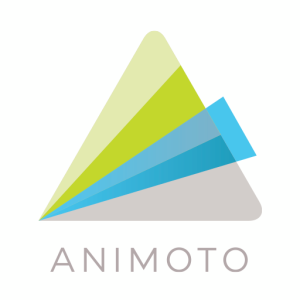
Start creating fabulous, irresistible videos about your family history with Animoto.com. You don’t need special video-editing skills: just drag and drop your photos and videos, pick a layout and music, add a little text and voila! You’ve got an awesome video! Try this out for yourself at Animoto.com.

MyHeritage.com is the place to make connections with relatives overseas, particularly with those who may still live in your ancestral homeland. Click here to see what MyHeritage can do for you: it’s free to get started.
PROFILE AMERICA: June Weddings

PRODUCTION CREDITS
Lisa Louise Cooke, Host and Producer
Sunny Morton, Editor
Diahan Southard, Your DNA Guide, Content Contributor
Lacey Cooke, Service Manager
Vienna Thomas, Associate Producer
Check out this new episode!
by Lisa Cooke | Mar 12, 2017 | 01 What's New, Irish, Legacy Tree Genealogists |
Let’s trace your Irish ancestors! Irish research tips are a must-have for this historically violent little island. Senior Researcher at Legacy Tree Genealogists, Kate Eakman, shares with you four historical and geographical tips to get you off to the right start.
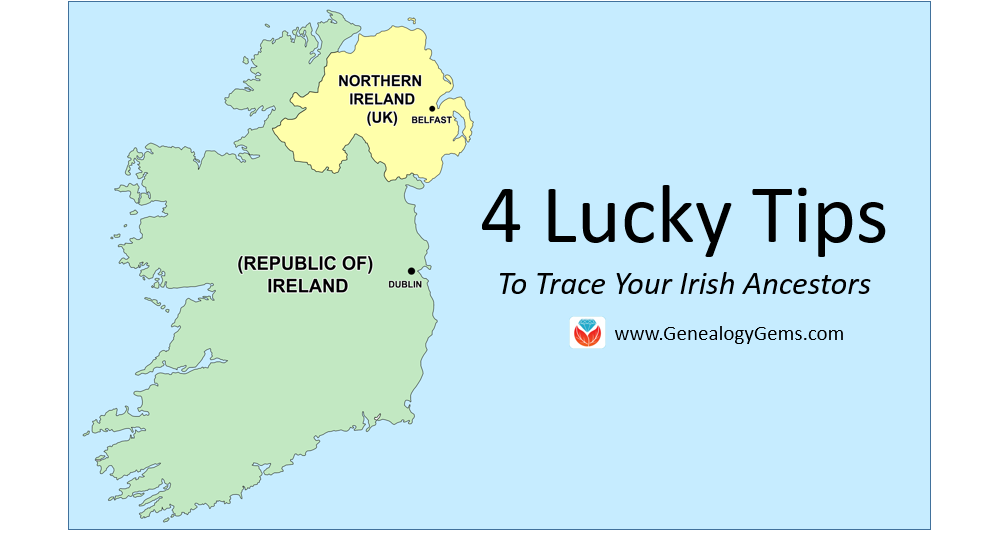
By Jonto at English Wikipedia [GFDL (http://www.gnu.org/copyleft/fdl.html) or CC-BY-SA-3.0 (http://creativecommons.org/licenses/by-sa/3.0/)], via Wikimedia Commons
Trace Your Irish Ancestors: 4 Tips
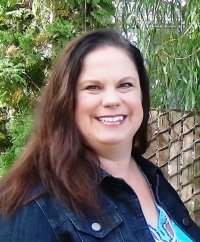
Kate Eakman from Legacy Family Tree Genealogists
Irish research can be difficult. Although the island is small–about the same size as the state of Indiana–its violent history and many divisions makes research complicated. In addition, many United States records simply report our ancestors were from Ireland with no indication of the county of their birth. However, knowing a little bit about the history and geography can provide the necessary clues. Here are four tips that can help you trace your Irish ancestors from the United States back to Ireland.
Tip 1: Understand the Island of Ireland Today
There are two distinct political entities on the island of Ireland: Northern Ireland and the Republic of Ireland. The dividing line was drawn by England in 1922. This is an important date to keep in mind when searching for more recent Irish ancestors.
The Republic of Ireland, or Eire, is an independent nation made up of the southern 26 counties of Ireland. The Republic of Ireland is predominantly Catholic, with about 3% of the population identifying itself as Protestant. Indices and links to copies of the civil birth records for the years 1864 to 1915, marriages between 1882 and 1940, and death records between 1891 and 1965 are available for free from the IrishGenealogy website. (These records include those of the Northern Irish counties up to 1922.) Official copies can be ordered from the General Records Office in Dublin.
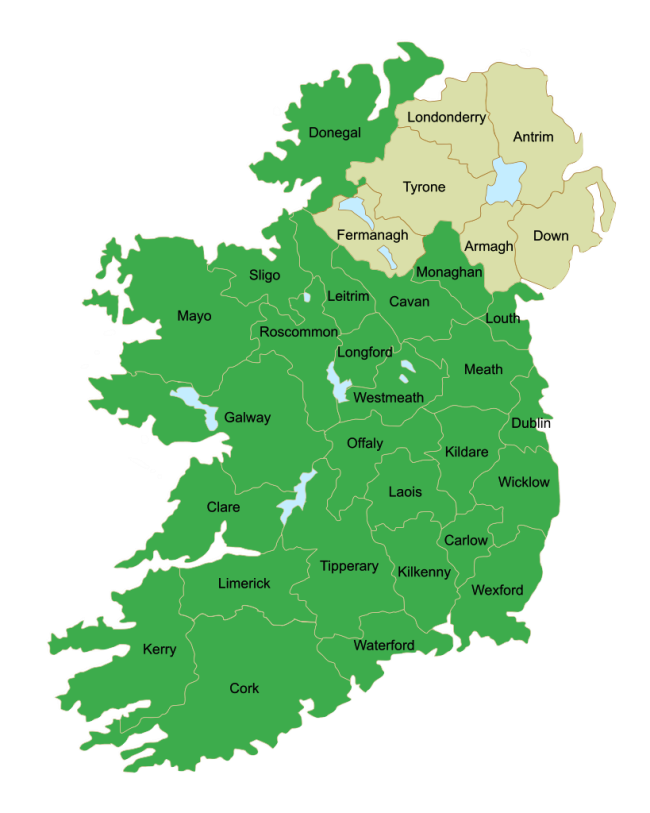
Map of the counties of Northern Ireland and the Republic of Ireland. Photo courtesy https://commons.wikimedia.org.
Northern Ireland, also known as Ulster, is a part of the United Kingdom–although it is self-governing like Canada or Australia. Although the counties of Northern Ireland are not officially used today, it is comprised of the traditional counties of Antrim, Armagh, Down, Fermanagh, Tyrone, and Londonderry (also known by the more traditional name of Derry). Although most Americans believe that Northern Ireland is a Protestant nation, the reality is that today there are almost an equal number of Catholics as there are Protestants in Northern Ireland. Civil birth, marriage, and death records can be ordered from GRONI (General Records Office Northern Ireland).
Tip 2: Turn to U.S. Census Records
From the 1880 U.S. Census through the 1920 U.S. Census, Irish ancestors who immigrated to the United States, or whose parents were natives of Ireland, simply reported they were natives of Ireland. However, since the 1930 U.S. Census was taken after the creation of the Republic of Ireland in 1922, it often noted the specific country from which ancestors originated.
In this sample (below) from the 1930 U.S. census, we can see John O’Reilly was born in “North. Ireland,” as were his mother and her parents. His father, however, was from the Irish Free State, or the Republic of Ireland. This information tells us where to search for John’s birth: in one of the six counties of Northern Ireland. His mother’s birth record will also be from Northern Ireland, and probably his parents’ marriage record also, since it is more traditional to marry in the bride’s hometown than the groom’s.
There is the potential that a much larger search will be necessary for John’s father’s birth record unless the marriage record can be found and it specifies in which of the 26 Republic of Ireland counties he was born.

John J. O’Reilly and his mother in the 1930 U.S. Census report. The detail shows where John was born, then his father’s place of birth, followed by his mother’s place of birth. The second line was the same information for John’s mother. Images courtesy http://ancestry.com.
If your Irish ancestor, or the child of that ancestor, is listed in the 1930 U.S. census, pay close attention to where they reported they and their parents were born. You might find a very helpful clue in that census report.
Tip 3: Look to Religion for Clues
While many people associate Roman Catholicism with Ireland, there are many Protestants living in Northern Ireland and fewer in the Republic of Ireland. Knowing your family’s historical religious preference can provide a small hint. If your family has always been Catholic it is likely they were Catholics in Ireland. However, as we have already noted, with almost all of the Republic of Ireland expressing a preference for Catholicism and about 45% of the citizens of Northern Ireland claiming allegiance to the Catholic faith, you can see a Catholic religious heritage is not particularly unique.
However, if your family history includes the Episcopal faith, or there is something that references “the Church of Ireland” in your family’s records, then your family was most likely Protestant when they lived in Ireland. You are also more likely to find your Protestant ancestors in Northern Ireland (with the understanding that there are Protestants throughout the Republic of Ireland).
If your family is or has been Presbyterian, there is a very strong likelihood your family is actually Scots-Irish with your ancestors immigrating to Ireland from Scotland, bringing their Scottish religion with them. You will find most of these ancestors in Northern Ireland.
Tip 4: Move on to Military Records
World War I (1914-1918) was particularly brutal to the Irish. More than 30,000 of the 200,000 men who enlisted were killed in this war. Songs such as “Gallipoli” and “The Foggy Dew” mourned the loss of so many young Irish men in foreign wars, especially since the 1922 Irish War of Independence followed closely on the heels of World War I.
If one of your Irish ancestors fought and died in World War I, you can find his name and more at the website Ireland’s Memorial Records. Many (but not all) of the memorials include the county in which the soldier was born, as seen below:
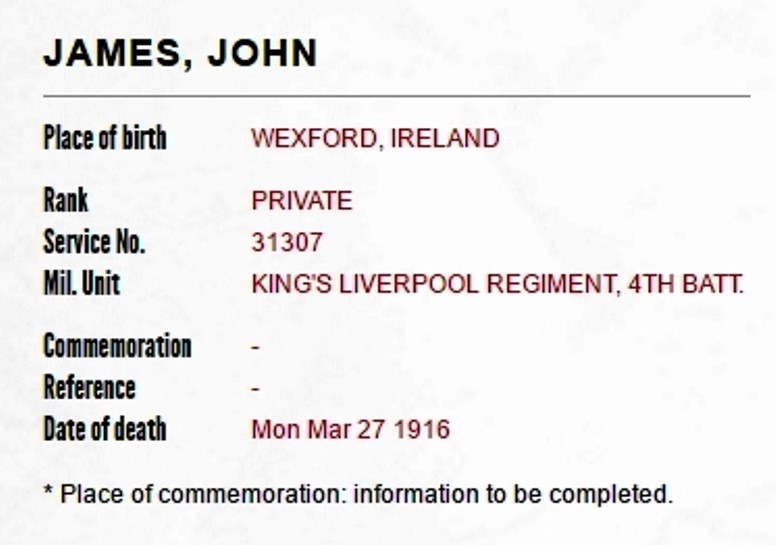
Memorial for John James of County Wexford. Courtesy Ireland’s Memorial Records.
Another website, Ireland’s World War I Veterans 1914-1918, has created a PDF list, updated every three months, which contains over 35,000 names of Irishmen who fought in World War I. If you know or suspect your Irish ancestor may have served in World War I and survived the experience, this is an excellent place to find a clue about his origins.
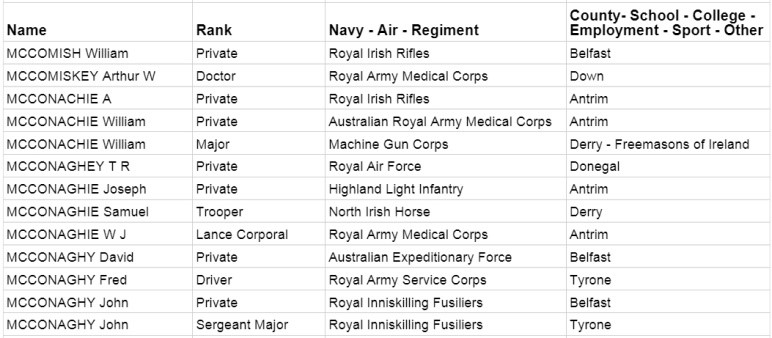
A sample of the list of those who served as created by Ireland’s World War I Veterans 1914-1918.
Although it can be difficult to find the correct place in Ireland for your family’s origins, there are some important clues, both historical and geographical, that can help you pinpoint a place to begin your search in Ireland.
Trace Your Irish Ancestors: In Conclusion
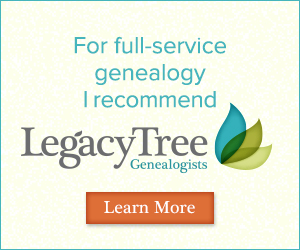 The 1930 U.S. census can provide an important clue to trace your Irish ancestors, as can your family’s religious heritage. If an Irish ancestor served in World War I, you may be able to determine the county in which he was born. A knowledge of the differences between Northern Ireland and the Republic of Ireland, as well as their location and the counties within those two countries, can help you contact the proper vital records office for those all-important vital records. So, go n-éirí leat! Good luck!
The 1930 U.S. census can provide an important clue to trace your Irish ancestors, as can your family’s religious heritage. If an Irish ancestor served in World War I, you may be able to determine the county in which he was born. A knowledge of the differences between Northern Ireland and the Republic of Ireland, as well as their location and the counties within those two countries, can help you contact the proper vital records office for those all-important vital records. So, go n-éirí leat! Good luck!
The team of expert genealogists at Legacy Tree Genealogists can help bust through your brick walls. They do the research and you enjoy the discoveries!
by Lisa Cooke | Mar 15, 2017 | 01 What's New, Irish, Legacy Tree Genealogists
Irish genealogy help is on the way! Starting your own Irish genealogy research can be intimidating. Lack of records and distance are just two obstacles to overcome. Lisa interviews Kate Eakman, Professional Genealogist specializing in Irish genealogy at Legacy Tree...
by Lisa Cooke | Oct 9, 2017 | 01 What's New, DNA, Health History
A Vitagene Wellness Report is now available to Family Tree DNA customers. The $49 report just takes a week and promises personalized recommendations for your nutrition, exercise, and supplements based on your genetics and lifestyle. Here’s what Your DNA Guide Diahan Southard has to say about it.
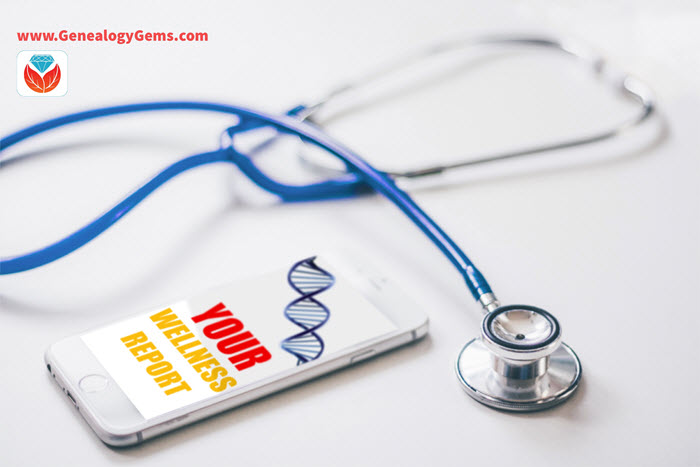
 Recently, Family Tree DNA offered its customers a new $49 add-on product: a wellness report that promises to “empower you to make more informed decisions about your nutrition, exercise, and supplementation.” The report comes via a partnership with Vitagene, a nutrigenomics company.
Recently, Family Tree DNA offered its customers a new $49 add-on product: a wellness report that promises to “empower you to make more informed decisions about your nutrition, exercise, and supplementation.” The report comes via a partnership with Vitagene, a nutrigenomics company.
How does it work? When you order the report, Family Tree DNA shares the results of your Family Finder test with Vitagene and gives you a lifestyle questionnaire. According to the site, “this information, along with your DNA raw data results, will be analyzed using the latest research available in the areas of nutrition, exercise, and genomics. You can expect your results to be available on your dashboard within one week of purchase.”
At this point, the test is only available to those who have taken the Family Tree DNA Family Finder DNA test (we called to check with them specifically about those who transfer their DNA to Family Tree DNA, but the Wellness Report isn’t available to them, either). Those who qualify will see a Wellness Report upgrade option on their Family Tree DNA dashboard, as shown below:
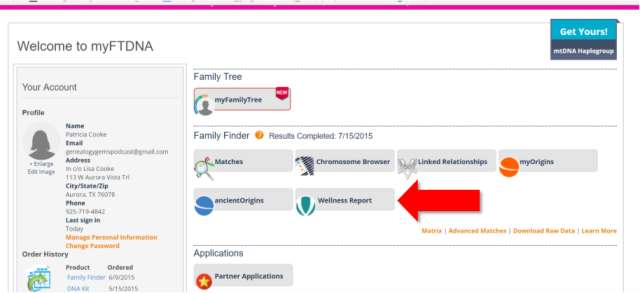
What’s included in the Vitagene Wellness Report?
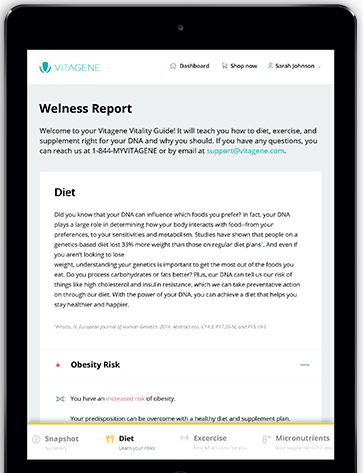 There are several components to the Family Tree DNA and Vitagene Wellness Report. The site describes them as follows:
There are several components to the Family Tree DNA and Vitagene Wellness Report. The site describes them as follows:
Nutrition Report. “Personalized, actionable recommendations designed to help you reach your weight goals. Learn how your DNA affects traits such as obesity risk, emotional eating, weight regain after dieting, and more. Included Reports: Obesity Risk, Alcohol Metabolism, Cholesterol Levels, Triglyceride Levels, Lactose Sensitivity, Gluten Sensitivity, Emotional Eating, Weight Regain After Dieting, Fat Intake, Sodium Intake.”
Exercise Report. “Outlines the optimal physical activities for your body to start seeing better results, faster. Included Reports: Power and Endurance Exercise, Muscle Strength, Muscle Cramps, Exercise Behavior, Blood Pressure Response to Exercise, Weight Response to Exercise.”
Supplementation Report. “Reveals which deficiencies you are more inclined to suffer from and recommends a supplement regimen that will help keep you healthy and feeling 100%. Included Reports: Full Supplementation Regimen, Vitamin D Intake, Vitamin A Intake, Folate Intake, Vitamin B12 Intake, Iron Intake.”
And what about your privacy? According to Family Tree DNA’s Q&A, “Your data is 100% secure and protected by industry standard security practices. We will not share your information without your explicit consent.”
A Little More about the Vitagene Wellness Report (and Others Like It)
This is just one of many services that are cropping up or will crop up in the future to offer additional interpretations of our DNA test results. (23andMe was the first major company in the genealogy space to offer these–click here to read about their health reports, and click here and here to read about the company’s long road to FDA approval.)
Essentially, each DNA test you do for family history looks at a certain number of your SNPs, or little pieces of DNA (not your entire genome, which is costly and isn’t necessary for genetic genealogy purposes). A nutrigenomic profile compares your SNPs with SNPs known to be associated with various conditions or ailments. (These genetic markers have been identified by researchers, many in academia, and deposited in ClinVar, a large, publicly-accessible database that itself is part of an even larger genetic database, SNPedia.) In this case of Vitagene, they are likely mining ClinVar for specific places in your DNA that pertain to nutrition, and were also evaluated as part of the Family Finder test.
Of course, many factors affect your health, nutrition, exercise capacity, and other wellness indicators, not just your genes. The purpose of reports like these is to give you just one more piece of information to weigh personally or with your health care provider.
When considering whether to purchase a nutrigenomics report such as this, I’d look carefully at what’s promised in the report, as well as the company providing it and the cost. Vitagene does also sell vitamin supplements, so they have a clear motivation to tell you about what supplements to take. And, for your information, Vitagene also offers this $49 health report for AncestryDNA and 23andMe customers.
Keep Reading: My Picks for DNA Health Reports

Of course, if it is health advice you want, for only $5 you can turn to Promethease.com and receive a health report–based on any testing company’s autosomal DNA report–that includes some nutritional factors. Or, I will just tell you right now, for free, without even looking at your DNA: Exercise more and eat more green vegetables and less ice cream. There. I just saved you some money. You’re welcome.
I’ve blogged recently about Promethease and another inexpensive recommendation for DNA health reports. Click here to read it!


 Halle(Saale), Military Recruitment Lists, 1828-1888 are now online at Ancestry.com.
Halle(Saale), Military Recruitment Lists, 1828-1888 are now online at Ancestry.com.




























 Recently,
Recently, 
 There are several components to the Family Tree DNA and Vitagene Wellness Report. The site describes them as follows:
There are several components to the Family Tree DNA and Vitagene Wellness Report. The site describes them as follows: